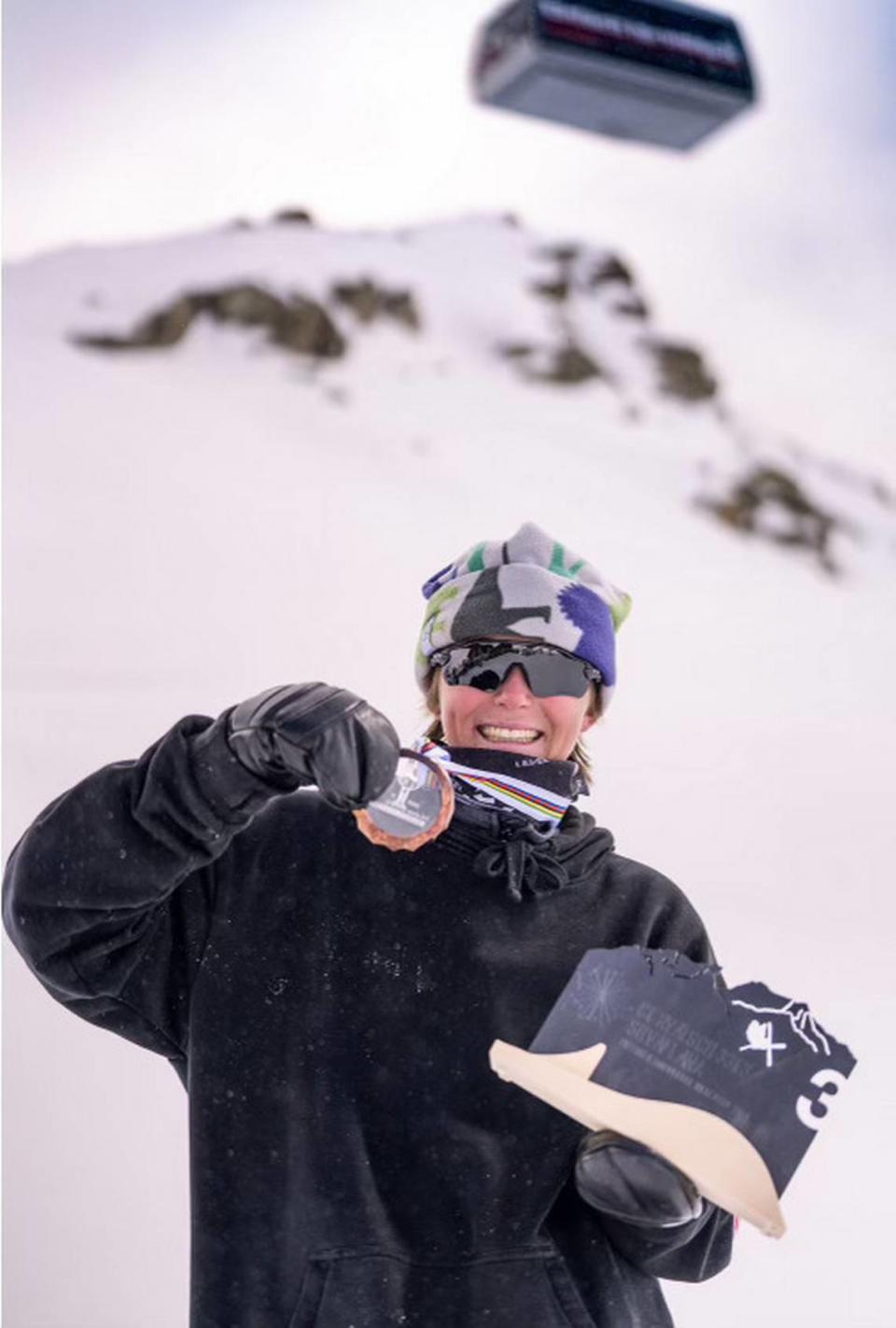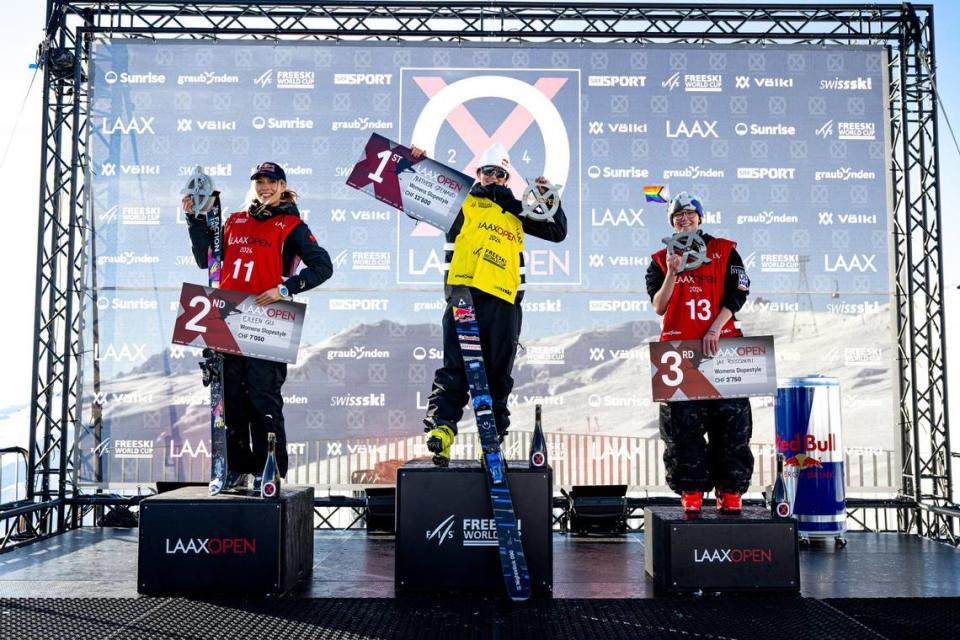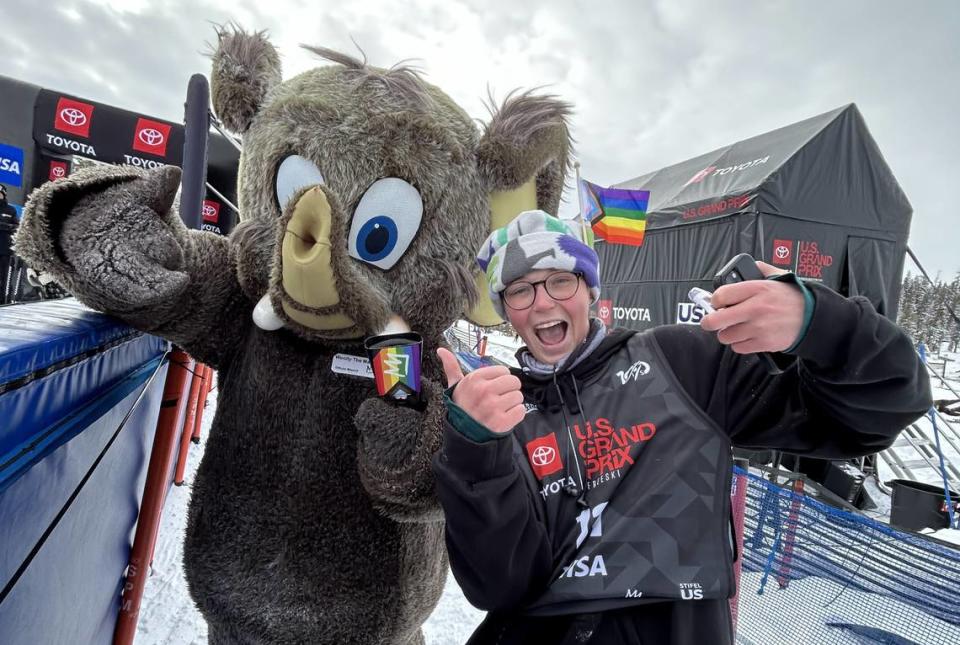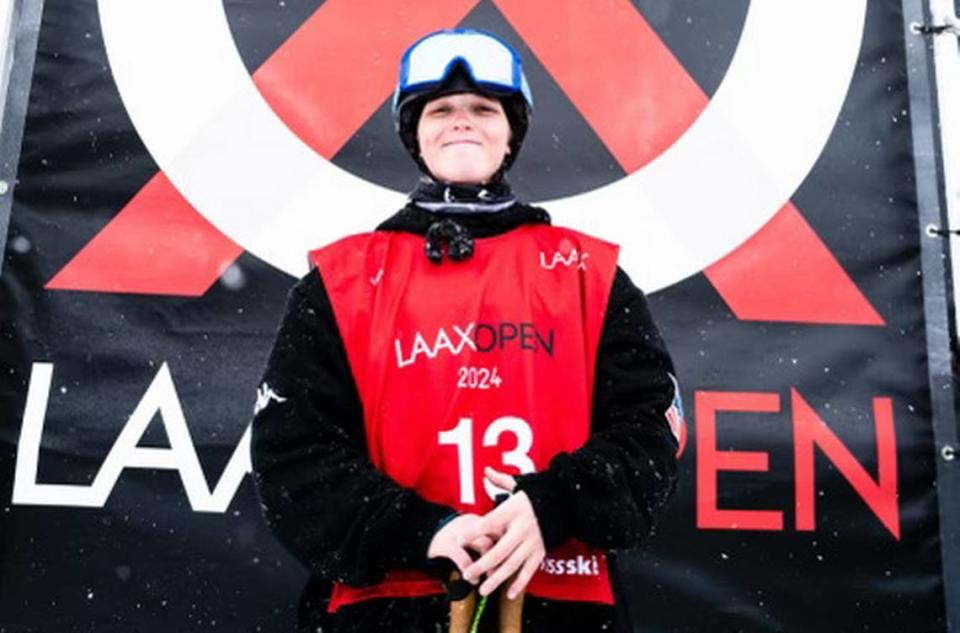Skier Jay Riccomini is focused on the next Olympics, being a role model for trans youth
Park City, Utah, where 20-year-old skier Jay Riccomini trains as part of the U.S. Freeski Rookie Slopestyle team, is nothing like the central Pennsylvania town where he grew up. Though they share a geography rich with mountains and forests, summers feel different in the West: oppressive humidity swapped for a dry, arid heat.
As attention turns to the Paris Summer Olympics, Riccomini has been looking forward to exploring the area in his last summer before focus shifts completely to the 2026 Winter Olympics. Once fall rolls around and brings cooler weather to Utah, he plans to traverse the state’s natural beauty, visiting the Uinta Mountains and Bear Lake.
He’s always loved the great outdoors — an interest nurtured while growing up in Port Matilda, during an adolescence full of hiking, fly-fishing, mountain biking and family camping trips to Lake Erie. He started skiing as soon as he could walk, a skill that came in handy on vacations to the Poconos and weekends spent at Tussey Mountain.
But for Riccomini, who came out publicly as transgender in 2021, surrounding himself with snow-covered slopes was more than just a hobby. It was a way of seeking community in spaces that embraced masculinity.
“I really felt like I fit in — like I could go into the woods and build forts after practice with all the guys on my team,” he said. “I often feel like I missed out on having a boy childhood, so it made me feel like I belonged, which had a big part in my love for skiing.”
Now in his fifth year on the U.S. team and his first full season competing on the World Cup circuit, Riccomini has turned a childhood pastime into a full-time career. Since coming out as trans, he’s continued to thrive on the slopes, receiving both praise from teammates and media attention from national outlets. He hopes to keep this momentum going and qualify for the Milano Cortina Winter Olympics — all while continuing to be a role model for trans youth.

Growing up on the slopes
Although Riccomini lived in South Carolina through first grade, both his parents are western Pennsylvania natives. His dad, Paul, earned his Ph.D. at Penn State and always dreamed of moving back. So, after a decade working at Clemson University, Paul and his family packed up one summer and returned to State College, where he continues to teach.
Before he started skiing competitively, it was rare to find Riccomini off the field. His elementary school schedule was packed with soccer and lacrosse seasons, tumbling classes and snowboarding at Poconos Academy. At Park Forest Elementary and middle school, gym was his favorite subject.
All three Riccomini siblings — Jay, his older brother Tyler and his younger sister Sarah — learned to ski by the time they were 2 years old. Their dad, a former ski instructor in his hometown of Edinboro, made sure of it.
Riccomini’s earliest skiing experiences were at occasional visits to Beech Mountain in North Carolina, his mom, Andrea, said, though ski trips became more frequent after settling into Port Matilda.
“In State College, there’s Tussey Mountain, so we would buy the season pass,” she said. “There were two winters where we rented a place (by Big Boulder Mountain) and would go over there every weekend to train.”
It was Riccomini’s brother, Tyler, who he credits with his early interest in park skiing — first, watching him practice at Tussey’s small terrain park, then competing together on their school’s intramural team and through the United States of America Snowboard and Freeski Association.
Tyler, now 23 and a freestyle ski coach in Missoula, Montana, remembers his younger brother following him and his friends around on the slopes. It was clear from the beginning that he had real talent.
“He just really enjoyed it, and I think that’s what kept it going more and more,” he said. “I thought it was cool that Jay was able to hang out with us and also push his skiing ability.”

On spring break trips to Copper Mountain in Colorado, Riccomini’s park skiing skills blossomed even further. He met his first coach, Dean Spirito, during a group class and begged his mom for a private lesson the next day — coincidentally, his birthday.
But it wasn’t until his first New Year’s Eve rail jam at Woodward Copper that he started taking skiing seriously. It’s a high he still chases on the slopes today, he said.
“It’s so vivid in my memory — this rush of adrenaline,” Riccomini said. “My brain switches off, and I don’t have to think about anything else.”
Today, he specializes in slopestyle, a category that prioritizes smooth, clean runs over complicated jumps. It evokes nostalgia for his East Coast skiing roots, he said, where he spent his teen years perfecting rails and boxes at Tussey and Big Boulder.
‘This is just who I am’
While improving on the slopes may have felt like an obvious progression, growing into his trans identity was a slower, more difficult process. When he was younger, he insisted on only signing up for co-ed sports teams and hated when he got stuck playing lacrosse with the girls.
“My brother got to wear all the gear, and they’re a little more rough,” Riccomini said, “so I would get really jealous.”
It took a while to assign a name to the feelings he had been struggling with. Even through middle school, he said, he was unfamiliar with the language of the LGBTQ community. Mostly, he just used the label “tomboy.”
Most trans people around Riccomini’s age recall a moment where they sought to understand their identities on the internet, searching feelings like “girl trapped in a boy’s body” — but this was never the case with Riccomini, he said.
Everything he learned was through conversations with his peers.
In eighth grade, a friend who was trans introduced him to the term, later ordering Riccomini his first binder when he was 14. Still, it wasn’t until the summer before junior year of high school that Riccomini started identifying as trans, and it wasn’t until he turned 17 that he decided to come out publicly.
Three years have passed since he first shared his trans identity on Instagram in July 2021, a post he made while at a winter sports school in Park City. The spur-of-the-moment decision followed a series of slower, smaller choices — gradually coming out to friends at school, using they/them pronouns, asking peers to call him JJ — but he hit a point where he couldn’t keep it a secret any longer.
“When you’re in that situation, your brain goes to the worst possible scenario: I’m going to get kicked off the team, and I’m not going to be allowed to compete anymore,” Riccomini said. “That made it really hard to publicly come out, but it was one of the best decisions I ever made.”
It’s perhaps only rivaled by the decision to have top surgery two years later in 2023, something Riccomini said he was “all in on” from the start. The benefits were immediate: Strangers stopped misgendering him, and his confidence on and off the slopes skyrocketed.
“It fully sealed the deal for me as a trans person,” he said. “I feel so much better in my body. There’s nothing wrong with me. This is just who I am.”
This reassurance in his identity also makes it easier to grapple with some of the tougher choices he’s had to make as a trans athlete — mainly, to continue competing in women’s events and hold off on taking testosterone until his skiing career ends.
His feelings on the subject tend to ebb and flow. Sometimes, he said, he thinks he’d be happier on testosterone but knows it would come at the expense of skiing professionally. Having had access to some level of gender-affirming care through top surgery is comforting.
If he decided tomorrow he wanted to start testosterone and stop skiing, Riccomini said, he’d do it for his mental health. So far, though, maturing as a person has made it easier to ignore the noise and just ski, he said.
“I’ve learned to accept that this is what’s best for me,” Riccomini said. “I think of it as I’m just competing in skiing, and it doesn’t matter if it’s the men’s or women’s category… I’m there to have fun, compete and lift others up.”

Looking ahead
Since coming out, Riccomini has learned about other LGBTQ athletes helping to normalize trans identities in the Olympic sphere. He looks up to athletes like Nikki Hiltz, a runner who will be one of the few trans competitors at the Paris Summer Games.
He also found inspiration in Leo Baker, a trans skateboarder who took the opposite path to Riccomini: Instead of continuing to compete competitively, he dropped out of the 2020 Olympics and started taking testosterone.
Baker’s experience is reflected in his documentary, “Stay on Board,” which encouraged Riccomini to start working on a documentary of his own: “Weightless,” a project focused on his own journey to top surgery. The goal, he said, is to highlight the importance of gender-affirming care for trans youth.
“Weightless” began as a solo project but has since grown into something larger, backed by a team of queer athletes and filmmakers. If Riccomini qualifies for his first Olympics, he said, he’d love to include the experience in the documentary and reach a wider audience by signing with a company like HBO.
Carrying new responsibility as an out trans athlete can be exhausting, Riccomini said, especially when he’s expected to educate people on the experiences of both trans men and women in sports. He’ll always be an advocate, but he acknowledges he’s still learning himself, too.
One of his personal highlights over the past few years, though, is getting to be a role model for young trans and queer skiers who are still in the closet, he said. Hearing that he’s played a part in helping a young athlete feel comfortable with their identity is an unbeatable feeling.
“I want to make sure that these kids who are struggling have more tools than I did to succeed in life — to live past 16 years old,” Riccomini said. “I want to be there for trans youth as much as I can.”


